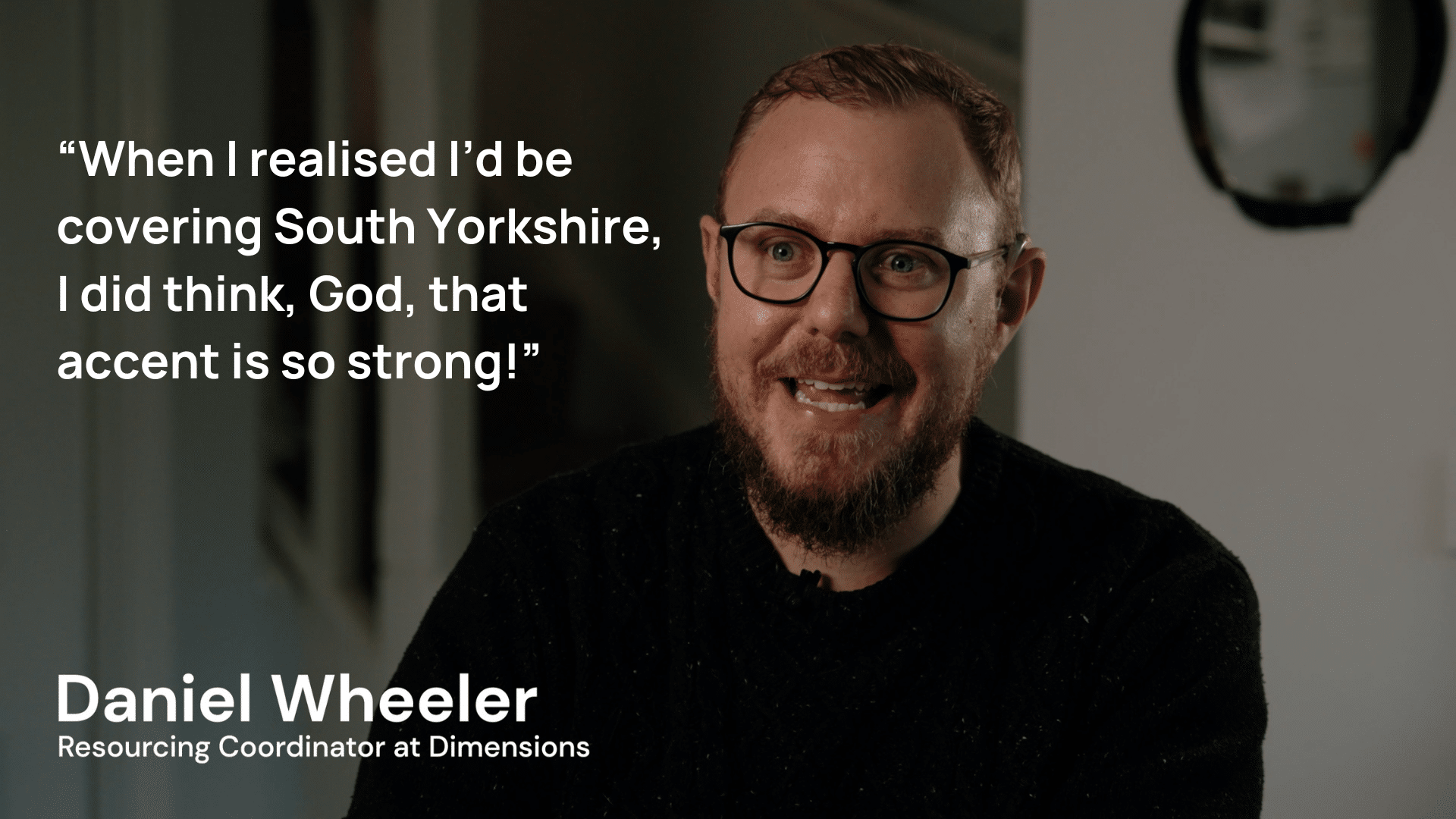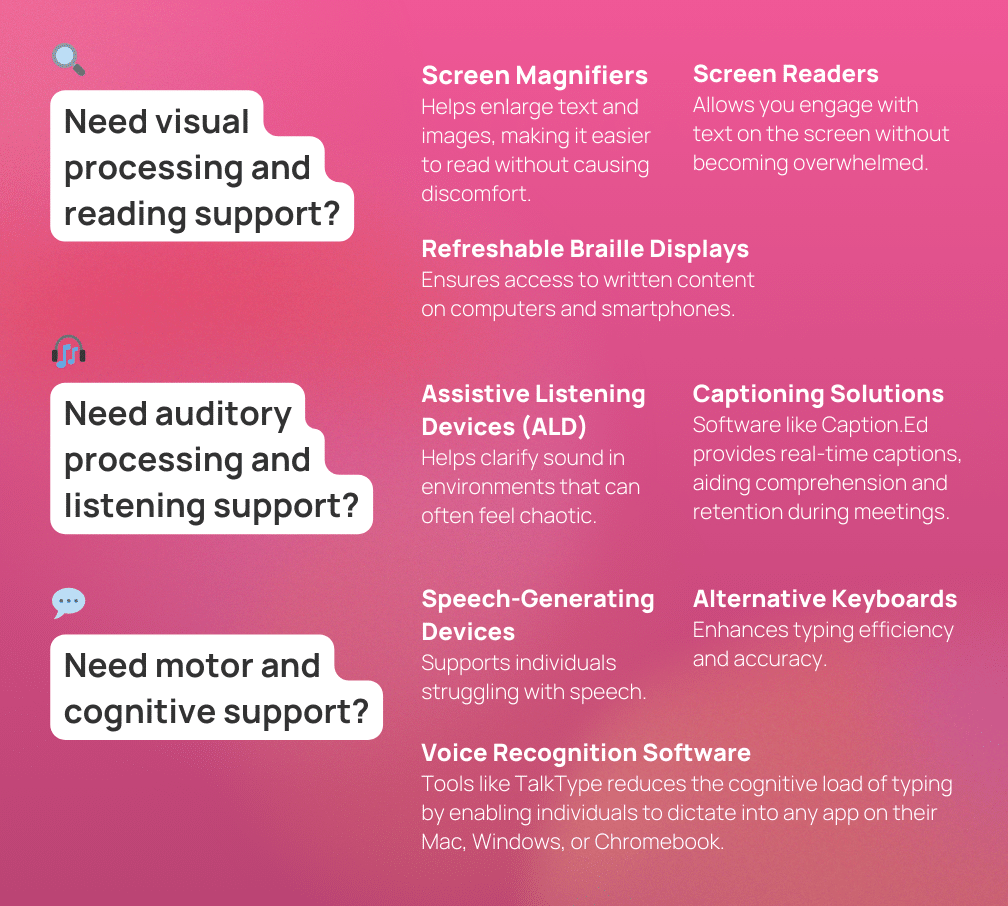These Great Minds November 2024

Daniel is a Resourcing Coordinator at a UK non-profit. Born Deaf, he uses a cochlear implant to assist with hearing. Despite the life-changing benefits of his implant, Daniel still faces challenges when handling calls at home — sometimes as many as 15 a day. 🤯 The real difficulty arises when speaking with clients from different regions across the UK. Understanding varying accents on top of the daily challenges of remote communication? It’s certainly not an easy task.
Hi again! 💗 It’s always great to have you here with us in These Great Minds. In this edition, you’ll find everything you need to know about Assistive Technology (AT), including what it is and how it can empower you.
Stick around till the end for ✨ 3-step guide ✨ to access the AT tools you need to thrive at work.
What is Assistive Technology (AT)?
AT refers to tools, devices, and systems designed to help individuals with disabilities, neurodivergence, or learning challenges. These tools can make everyday tasks easier, whether at home, in education, or at work.
It is here to empower neurodivergent employees like you, ensuring that you feel supported, accommodated, and able to thrive in your role.
Last month, I was listening to our Skill Sessions webinar with AXA UK. I was reminded once more how life-changing AT can be when I heard Nicki’s story. Nicki lost much of her sight when she was 22 and was told she wouldn’t be able to work. “For a short period, I actually believed that,” she shared with us (skip to 10:24). Fortunately, Nicki got access to the right Assistive Technology, and it completely transformed her life.
By understanding her needs and getting the right adjustments, she was able to get back on track and continue doing the work she loves. 💪
Different barriers, one reason
Barriers to performing well at work go beyond physical disabilities. For many employees, especially those with other disabilities and neurodivergence, feeling excluded remains a persistent challenge. It’s easy to fall into the trap of masking (what is masking?) which can leave you feeling drained, less productive, and reluctant to engage in everyday conversations or meetings.
👉 The reality is, disengagement is something every employee faces at some point.
We can’t possibly bring our full energy to every, single meeting. Whether you’re neurodivergent or not, our brains get tired, and sometimes, we can find ourselves daydreaming in the middle of an important discussion (we’ve all been there!).
Or, like Daniel, we might struggle with understanding different accents or dialects. With an estimated 40-56 accents across the UK, who can blame us, right?
What are the main barriers at work for you?
At the end of the day, we all face so many different and unique barriers at work — but often, they stem from one core issue: 🚧 our needs are not being met.
💗 The good news? This can change. What if you had a trusted “buddy” to support you during those moments?
“Caption.Ed is my buddy,” says Daniel.
Here’s the happy ending to Daniel’s story: to better understand different regional accents and dialects, Daniel began using Caption.Ed, a piece of captioning and note-taking software.
For Daniel, this assistive technology is more than just a tool; it’s his “buddy” during every call. He says it helps him feel equal to everyone at work, providing the support he needs to stay engaged and productive (how? watch here).
Just like Daniel, when you use the right assistive technology, you can…
✅ break down barriers and actively participate in meetings
✅ collaborate more with your team, and feel more included
✅ improve your productivity, and gain a stronger sense of independence and motivation
Does this sound too good to be true? Well, it’s possible! Just follow our 3-step guide. 👇
3-step guide to better productivity and autonomy
1️⃣ First things first: Let’s find the right AT tool for you!

2️⃣ Is there any software already available?
Before diving into new tools, it’s a good idea to check with your organisation to see what assistive technology they already have on hand. Employers in the UK are legally required to provide reasonable adjustments, including Bluetooth headsets, alternative keyboards, or screen readers to support their employees.
While these tools can be a good start, they might not be a perfect fit for your needs. 🤔 If you find that tools available to you aren’t enough to help you feel fully supported, don’t worry — there are other possibilities to consider. ⤵️
3️⃣ Apply to Access to Work Scheme
The UK government’s Access to Work scheme provides grants for practical support, including access to specialist equipment or assistive software. Gabrielle’s journey through the Access to Work Scheme is a powerful example of how assistive technology can transform the way you work.
Your Guide to Access to Work Scheme
Watch our 5-minute video about the Access to Work Scheme, how you can apply, what criteria you need to fulfil to be eligible, and more.
🎉 You made it to the end! I’ll leave you with this final thought as you head into your day:
With the right tools in place, people like Nicki, Daniel, and Gabrielle, feel more relaxed and productive, knowing their assistive technology is there to support them. 💗 Why not make this your story too?
✨ We would love to hear your thoughts about our newsletter. ✨
Thank you for joining us today. Feel free to copy this link and recommend our newsletter to your peers if you think they’d find it valuable. Keep an eye on your inbox for the next edition. Until then, I would love to hear your thoughts about our newsletter.
Looking forward to speaking you again next month! Subscribe now to receive the next edition. 📩

These Great Minds 🧠
Learn more about our monthly newsletter for neurodiverse professionals
Have you heard of Daniel’s story?
Explore the inspiring stories of Daniel and other neurodivergent professionals and grab your 3-step guide to access the AT tools you need to thrive at work.